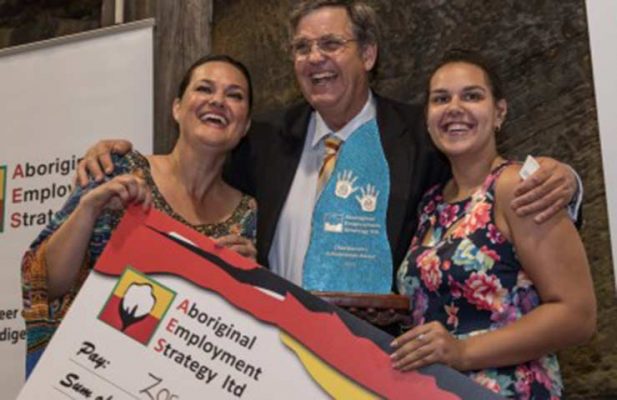Indigenous recruitment and group training company, the Aboriginal Employment Strategy (AES) is building career pathways for young Indigenous people across Australia one job at a time through its Careers Preparation Program (CPP).
So far, around 1500 students have graduated from the CPP which is designed to build career pathway thinking and to open the door of opportunity to young Indigenous people. The program places students into traineeships or apprenticeships during Year 11 and 12 with host employers.
In recent weeks, students have graduated at special ceremonies across NSW and Queensland. On 10 December, the latest group of graduates boarded Sydney’s Tribal Warrior ship for a special graduation ceremony on Goat Island.
The AES is a 100% Indigenous managed, not-for-profit organisation that specialises in placing and mentoring Aboriginal and Torres Strait Islander people into employment. It has a solid and respected reputation as a recruitment agency that has dual benefits: to host employers and in making a real difference in the lives of young Aboriginal and Torres Strait Islander people.
“Under the CPP, students complete work placements, Certificate II and career pathway activities, while they are studying for their Higher School Certificate. This gives them a head start on learning what it’s like to work in a company and juggle competing demands – great skills for life’s challenges and opportunities ahead. We also place young people into fulltime apprenticeships,” AES CEO Kristy Masella said.
“More than 50% of our trainees go onto fulltime employment with their host employer after finishing the program. There are those who also go onto university or further training and have a clearer idea of their career pathway.
“The big benefit of the CPP to our young Indigenous people is that it allows them to get paid while they gain work experience. The workplace skills they learn also give them an edge in today’s competitive jobseeker marketplace.
“I think the other longer term career benefit is that they understand the concept that hard work brings rewards, and they develop a real work ethic that can’t be learned in books.”
The December graduation marks a busy end of the year for AES, a year where one focus has been on identifying the gaps in the marketplace and then working with industry leaders to fill those gaps, while training young Indigenous people with the skills they need for a job within that industry.
It’s a focus that has paid off for the AES. One of the gaps has been in the construction industry.
“They can’t find enough workers. We have been working with Aboriginal Pathways (training organisation) and with industry to identify the skills and knowledge needed so that workers can come on site and be work ready,” Kristy said.
“We’ve designed an intensive pre-employment program which has been endorsed by industry, and industry has said to us, ‘if you can deliver work ready people, then we’ll give them a job’.
“This has been a fantastic outcome for young job seekers who may not have been competitive before the pre-employment program. So far we have put 20 young Indigenous people through the program and 18 have gone onto to fulltime jobs.”
2016 is shaping up to be another busy year for the AES and they’ll be rolling out new programs next year, including the CPP and the pre-employment program.
“We’ll be working with new corporate partners next year, working closely with industry to understand their needs and skilling up young Indigenous people so they can move into fulltime jobs.”
Minister for Innovation and Better Regulation Victor Dominello said AES’s programs provide young Indigenous people with a range of training and career opportunities.
“Over the past 18 years AES has inspired and empowered young Indigenous people to realise their potential through mentoring and traineeship programs,” he said.
“These programs have transformed lives and communities.”
Established in 1997, the AES has offices in 10 strategic locations across Australia. It brings an Indigenous ‘know-how’ to the table to match the right career seekers to the right opportunities with a proven track record on placement and retention.
The AES was started in Moree by cotton farmer, Dick Estens AO, with the support of the Cotton Industry through the Gwydir Valley Cotton Growers Association. The AES grew out of recommendations of the 1991 Royal Commission into Black Deaths in Custody to establish promotion committees nationwide for Aboriginal employment.
Since 1997, the AES has transformed over 12,000 lives through providing Aboriginal and Torres Strait Islander people with career opportunities.
The AES is seen as an innovator and leader in Aboriginal employment and training.

